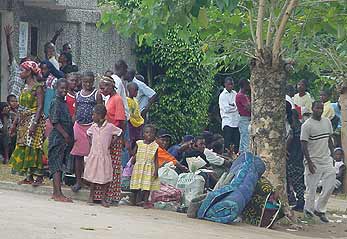UNHCR concerned about displaced people in Ivorian hotspots
UNHCR concerned about displaced people in Ivorian hotspots

ABIDJAN, Côte d'Ivoire, October 8 (UNHCR) - With the collapse of cease-fire talks and the renewal of fighting in Côte d'Ivoire, the UN refugee agency has reiterated its concern over reports of widespread displacement and the continued razing of shantytowns in Abidjan.
Sunday saw the collapse of cease-fire negotiations following a September 19 attempted coup in Côte d'Ivoire. Since then, fighting has re-ignited in Bouaké, where the Red Cross says 150,000 to 200,000 out of the 600,000-strong local population have fled in recent days. Conditions in Bouaké are worsening, and the lack of water, food and electricity is driving many residents to seek shelter with relatives in other parts of the country.
On Monday, an inter-agency humanitarian mission (consisting of agencies like UNHCR, the UN World Food Programme and the World Health Organisation) headed towards Bouaké to assess the dire humanitarian situation there, but was turned back on the outskirts of Abidjan for security reasons. On Tuesday morning, a smaller team left Abidjan again, this time for the capital, Yamoussoukro, to monitor the situation. Depending on security conditions, they could move from the capital to Bouaké in the next few days.
Meanwhile, in the main commercial city of Abidjan, houses in shantytowns continue to be demolished, rendering thousands of locals, migrants and refugees homeless. The authorities' position on the razing of the shantytowns remains conflicting - the city's Governor announced that the operation would be completed in one month, while the Minister of Human Rights said the burning would be suspended for 10 days.
The minister told UNHCR that this was not an operation against foreigners, as many Ivorians have also been affected. She reiterated that refugees have always been welcome in Côte d'Ivoire and remain so.
The proposed suspension of razing, which has yet to happen, would be welcomed because it would give humanitarian agencies more time to find alternative accommodation for the thousands of people who are being displaced daily.
Since September 19, the UN refugee agency has assisted more than 800 displaced refugees in five accommodation centres in Abidjan. The refugees are living in very difficult circumstances, in overcrowded temporary sites with scarce water, poor sanitary conditions and worsening health problems.
The refugees, mainly from Liberia and Sierra Leone, are afraid to be seen in the streets, where anyone speaking a foreign language is suspect. Several of them have been harassed in the streets. Some have been robbed. Yet others report that policemen have been asking them to pay 10,000 CFA ($15) to avoid arrest as suspected assailants.
According to preliminary statistics, 16 per cent of displaced refugees are children under five, while another 21 percent are under 18. UNHCR's non-governmental agency partner, Save the Children UK, is taking care of separated children and a UNHCR community services officer is visiting the centres daily to evaluate the situation. On Friday night, a pregnant refugee died of haemorrhaging because she could not be transported to the hospital during the curfew.
Beyond hotspots like Abidjan and Bouaké, the situation is also tense along Côte d'Ivoire's borders with neighbouring countries. UNHCR sub-offices in Tabou and Guiglo, in the south and south-west respectively, reported some movement across the border towards Liberia and Guinea, but there has been no large-scale movement.
Côte d'Ivoire hosts a total of 72,000 refugees. UNHCR assists about 2,000 urban refugees, mainly from Liberia and Sierra Leone, in Abidjan.








